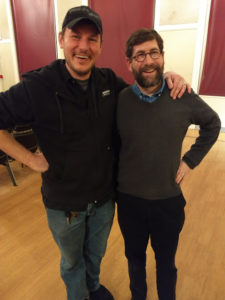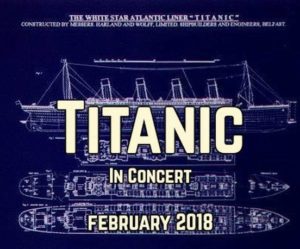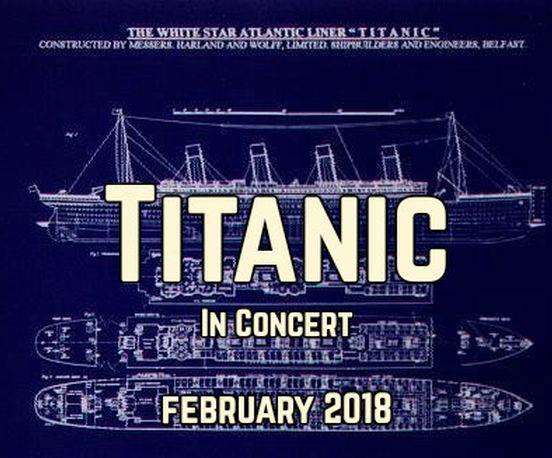“Our task was to dream upon and then create— a floating city!” The ship of dreams, so she’s called, in her finest element— the musical— Titanic sails for Heritage Players this winter! Debuting upon the stage of the Rice Auditorium at the Spring Grove Hospital Campus, Heritage Players is performing Titanic in Concert as their winter production offering. Exploring this ship of dreams, TheatreBloom sits down with Director David Jennings and Musical Director David Zajic to discuss the living dream of this massive musical.

Greetings to you both and thank you for taking a minute before your rehearsal this evening to sit with us and explore Titanic. If you’d just tell us who you are what you’re doing with the show, we’ll set sail and get underway.
David Jennings: I’m David Jennings and I’m actually the director of the production here for Heritage Players.
David Zajic: I’m David Zajic, and I’m the music director and conductor.
What made you interested in wanting to be a part of Titanic?
David J: Titanic, to me, is one of the best written musicals of late in my opinion. The music is outstanding, it surpasses most. The story is a beautifully and emotionally impactful story. It’s a wonderful telling of the event.
David Z: This show was not actually on my radar until I was invited to conduct it. I just did not know the piece. As I’ve gotten to learn it, I’ve come to understand just what a fantastic “old-school” style musical this really is. Some of the jokes that are in it really have the feel of a great 1950’s or 1960’s show. The orchestrations, which we are using the full original show orchestrations and we have a full 25-piece orchestra here, really have the old school feel to them. I’ve played a lot of classic shows, like Camelot and My Fair Lady, and this has that feel to it. And it was written in 1997. I think the creative team was really harking back to a classic era, a classic vocabulary.
And just to expand on what David said about the story, I think this musical explores themes of class and the way that people of different classes feel about each other. It also explores the immigrant experience. It uses these characters and this event to show different people’s attitudes toward these things. A lot of these things show up in these character songs, which are so wonderful and there are so many of them.
This is Titanic, in concert. And I know that isn’t a concept that a lot of theatergoers are necessarily familiar with, but I’m led to understand that it’s the music and story of a show— in this case, Titanic— without all of the staging elements like set, costumes, and blocking, that would normally accompany a full production.
David J: It’s interesting that you bring that up. I’ve expanded on this idea of “concert.” I wanted to maintain the emotional impact of the show. I felt that with the number of characters that we have and the number of actors that we have needed to cover all of those characters that it would be best to actually stage the concert. So the concert is fully stage. There won’t be a “set” but we have very artistically handled that situation with projections that tell you where you are on the ship and those will change throughout the show. But we’ve fully staged this musical, lights and costumes, and blocking. I really feel like that helps you maintain that emotional impact. There is a certain idea of concerts that you have in your head and I didn’t want to just go with that. If we’re telling the full story, we really need to bring the audience in. I felt everyone just standing in a line on stage and stepping forward for their bit, we would lose energy and we’d deprive the audience of a beautiful storytelling experience. So is it a full production? No. Is it a concert? I say it is a “Concert Plus.”
David Z, what is the difference for you in musically directing and conducting this, as David J calls it, “Concert Plus” versus a fully staged musical?
David Z: There would be fewer cognitive demands on the singers if they were not engaged with motion and blocking. Just a literal-level answer to your question, you’re trying to get them prepared musically in a way that they’ll be able to do these other things as well. I would say that musically I have approached this like I was preparing a concert, as if I was giving a great oratorio with a chorus. Everybody in this show is both the chorus and leads. There is nobody who doesn’t have a character at some point in the show. As you know, it’s an ensemble show. There’s not one or two leads who are carrying the show. Everybody has a character and everybody has a story. So I treat the ensemble as both soloists and as a chorus. And then we’re going to integrate with the orchestra, with the same level of care that you would as if you were giving a concert.
Titanic is the ship of dreams. What does it mean to get to bring this particular dream to life for a live audience?
David J: It’s actually pretty amazing. I have to say as this process has gone on, I’ve become more and more inspired. It’s kind of moving with my dream of directing, and moving more in that direction of producing and directing shows. This will be the largest cast that I’ve directed and worked with to date. There are 23 people in this cast. It’s a dream come true. It’s all working out and I am so proud of this piece, more so than I thought it would be. I don’t want this experience to come to a conclusion. I want to keep going because it’s just been such a marvelous time and it really has been a dream come true.
David Z: I’m going to give you an answer which is both about this piece and this space. It may not necessarily be obvious when you’re first coming into it, but all of the characters in this show are based on real life people who really were on the ship. The famous people and the not so famous people were real people. As performers telling a story, communicating about our shared experience, the fact that these were real people who had goals— they didn’t go on that ship for the purpose of becoming famous, those were real people who had real goals who experienced that terrifying and extraordinary experience— playing these parts and trying to convey what people like them might have thought is really a unique way of connecting with those actual people.
I want to tie that with this space. This is one of the oldest buildings that I’ve ever performed in. It was built in 1934-1936. It has a history as well. This was a social hall and a movie theater. This is a space in which people have been having their experiences and their lives for more than 80 years. I feel like this performance, maybe more than other types of concerts and musicals that I give, I feel a connection to generations of real people who have shared, on one axis or another, the experience that I am trying to share.
For those people who are familiar with Titanic, be it the actual historical event, the musical, or the movie, what should audiences be prepared to expect when they come to see the Heritage Players’ production in concert?
David J: I would say you’re not going to be expecting the movie and I’m happy to say that. The musical far surpasses the movie, so please, if you have the movie in your mind, please let go of it. Come in for an entirely different experience.
David Z: I would emphasize that there is a trend or maybe an impulse to use “scaled down” orchestrations or even extremely technologically sophisticated canned music. What I would want people to focus on is that this is live performance. We’re not here to cut a CD or to make a video. This is live performance. We’ve got one time each, every performance is going to be unique. We’ve got a 25-piece orchestra and a 23-person cast. This is a lot of people bringing their attention, their focus together into each performance. I would encourage people to treasure this opportunity to experience live theatre, which is a very different experience from going to the movies or watching it on television or whatever.
What has this experience taught you about yourself so far?
David J: It’s taught me that people really can and do come together to create something absolutely wonderful. This is my first experience with a cast this big, with an orchestra of that magnitude, and even beyond that, my first experience with Heritage Players. It’s just refreshing, a refreshing atmosphere. It’s different people but everyone working hard towards the same goal and seeing that come to fruition. Learning that I can handle projects of this size is inspiring. I’m pleased.
David Z: Well this has a lot of moving parts. I think that disciplining myself to have flexibility; not everything is going to be laid out on day one. This is an evolving process. Disciplining myself to sort of go with opportunities as they arise has been both the challenge and the learning process for me.
Why do you want people to come out to Heritage Players to see this production of Titanic in Concert?
David J: Because if nothing else, this is a theatrical piece that everyone should see. It hits you in the emotions, in the feels. When this Broadway musical came out on CD, I couldn’t put the CD away. The music is incredible. It’s not a musical that’s done that often. There’s been a few productions here and there. But if you haven’t seen it yet, this is not something you should be letting pass you by. It is truly a very special opportunity.

David Z: Very much aligned with what David J just said, I think this is very much an underserved show compared with how fantastic it is. I think the theatre people are aware of this show, but maybe the audience doesn’t have this in their mind the way they do with things like My Fair Lady and other properties that have been performed a lot more. I would say just the opportunity to come out and not just enjoy that cast album, but experience all the stuff that stitches it together as a story, that’s why you want to come out and see it.
Titanic in Concert plays through February 18, 2018 at The Heritage Players in the Rice Auditorium of the Spring Grove Hospital Campus— 55 Wade Avenue in Catonsville, MD. Tickets can be purchased at the door or in advance online.


I can go to a 2pm on any Sunday!?